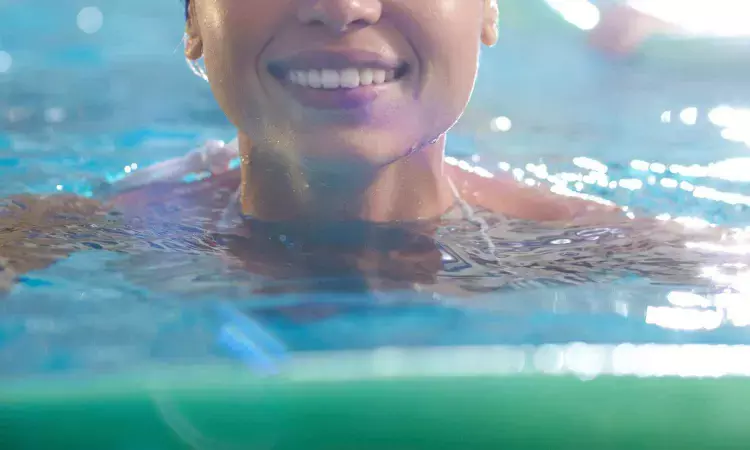- Home
- Medical news & Guidelines
- Anesthesiology
- Cardiology and CTVS
- Critical Care
- Dentistry
- Dermatology
- Diabetes and Endocrinology
- ENT
- Gastroenterology
- Medicine
- Nephrology
- Neurology
- Obstretics-Gynaecology
- Oncology
- Ophthalmology
- Orthopaedics
- Pediatrics-Neonatology
- Psychiatry
- Pulmonology
- Radiology
- Surgery
- Urology
- Laboratory Medicine
- Diet
- Nursing
- Paramedical
- Physiotherapy
- Health news
- Fact Check
- Bone Health Fact Check
- Brain Health Fact Check
- Cancer Related Fact Check
- Child Care Fact Check
- Dental and oral health fact check
- Diabetes and metabolic health fact check
- Diet and Nutrition Fact Check
- Eye and ENT Care Fact Check
- Fitness fact check
- Gut health fact check
- Heart health fact check
- Kidney health fact check
- Medical education fact check
- Men's health fact check
- Respiratory fact check
- Skin and hair care fact check
- Vaccine and Immunization fact check
- Women's health fact check
- AYUSH
- State News
- Andaman and Nicobar Islands
- Andhra Pradesh
- Arunachal Pradesh
- Assam
- Bihar
- Chandigarh
- Chattisgarh
- Dadra and Nagar Haveli
- Daman and Diu
- Delhi
- Goa
- Gujarat
- Haryana
- Himachal Pradesh
- Jammu & Kashmir
- Jharkhand
- Karnataka
- Kerala
- Ladakh
- Lakshadweep
- Madhya Pradesh
- Maharashtra
- Manipur
- Meghalaya
- Mizoram
- Nagaland
- Odisha
- Puducherry
- Punjab
- Rajasthan
- Sikkim
- Tamil Nadu
- Telangana
- Tripura
- Uttar Pradesh
- Uttrakhand
- West Bengal
- Medical Education
- Industry
Swimming tied to greater risk of developing dental staining and poor oral QoL than non-swimmers: Study

Swimming tied to greater risk of developing dental staining and poor oral QoL than non-swimmers suggests a study published in the Australian Dental Journal
Swimming has classically been associated with a distinctive type of extrinsic dental staining. However, its prevalence and characteristics have not been explored in Australia. This case controlled cross-sectional cohort study aimed to determine the prevalence and severity of dental staining among children who swim competitively compared to non-swimmers and its impact on oral health-related quality of life (OHRQL).
Parents and children from Western Australian swimming clubs completed a survey assessing swimming routine, risk factors for staining and OHRQL. Intra-oral photographs were taken and staining of anterior teeth was assessed using a modified Lobene Stain Index. A Global Stain Score (GSS) was calculated and compared against age-matched non-swimmer controls. Results: Maxillary anterior teeth from swimmers (n = 400) and non-swimmers (n = 400) were analysed.
Staining prevalence was greater in swimmers (83%) than non-swimmers (44%). GSS scores were positively correlated with both the total lifetime swimming hours and practice time (P < 0.05), with a significant difference in GSS between swimmers and non-swimmers (P = <0.001, OR: 6.21). Dietary factors for staining were not significantly correlated with GSS. Swimmers had a greater risk of developing staining than non-swimmers, and this negatively impacted their OHRQL. The extent and intensity of staining were associated with the amount of swimming.
Reference:
Patel, J., Cai, S., Huong, B., Macdonald, M. and Anthonappa, R. (2024), Competitive swimming and dental staining among Australian children. Aust Dent J. https://doi.org/10.1111/adj.13033
Dr. Shravani Dali has completed her BDS from Pravara institute of medical sciences, loni. Following which she extensively worked in the healthcare sector for 2+ years. She has been actively involved in writing blogs in field of health and wellness. Currently she is pursuing her Masters of public health-health administration from Tata institute of social sciences. She can be contacted at editorial@medicaldialogues.in.
Dr Kamal Kant Kohli-MBBS, DTCD- a chest specialist with more than 30 years of practice and a flair for writing clinical articles, Dr Kamal Kant Kohli joined Medical Dialogues as a Chief Editor of Medical News. Besides writing articles, as an editor, he proofreads and verifies all the medical content published on Medical Dialogues including those coming from journals, studies,medical conferences,guidelines etc. Email: drkohli@medicaldialogues.in. Contact no. 011-43720751


